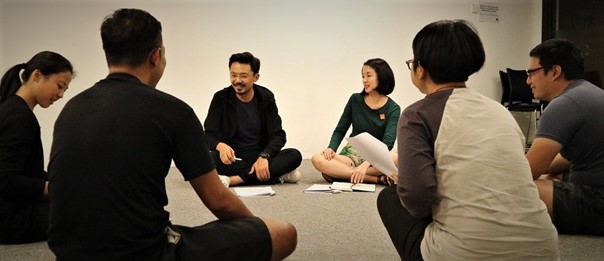by Rei Poh, Associate Dean, School of Theatre
The Relevance of Modern-Day Theatre in Everyday LifeIn today's rapidly changing world, the question of how modern-day theatre remains relevant in our daily lives is a pertinent one. As we witness the emergence of Artificial Intelligence (AI) and its influence on various aspects of our lives, it becomes increasingly important to understand what distinguishes us from AI generators. As our lives are intertwined with technology, we must emphasise the essence of “live” art and performance, harnessing the power of our bodies, voices, and imaginations in the creative process.
In my view, critical thinking, artistic perspectives, problem-solving skills, and aesthetics become even more crucial. These are precisely the skills that theatre education fosters in our students. Theatre offers a unique space where human emotions, creativity, and intellectual depth take center stage. It serves as a platform for exploring the complexities of human existence, shedding light on diverse cultures and perspectives, and pushing the boundaries of conventional thought. As I “co-write” this with ChatGPT, it is evident that ChatGPT does not form opinions on its own and still relies on me to drive the perspective.
 Rehearsal for M1 Fringe Festival 2018/Centre42 residency ATTEMPTS:SINGAPORE by ATTEMPTS. Credit: Gwen Pew (Centre42)
Rehearsal for M1 Fringe Festival 2018/Centre42 residency ATTEMPTS:SINGAPORE by ATTEMPTS. Credit: Gwen Pew (Centre42)
“The arts, function as a mirror reflecting society's hopes, fears, dreams, and challenges. Theatre itself, has the power to bridge divides, facilitate healing, and foster connections among communities.”
As technology often takes center stage and dominates the discourse, it is crucial to recognise the distinctive and irreplaceable role that artistic disciplines, such as theatre, play in our society. There are inherent limits to what AI can achieve for now when it comes to creating for a community. It is incumbent upon institutions, councils, and agencies to acknowledge the vital role that arts and theatre play in the well-being of a society.
The arts, function as a mirror reflecting society's hopes, fears, dreams, and challenges. Theatre itself, has the power to bridge divides, facilitate healing, and foster connections among communities. Moreover, it serves as a potent catalyst for provoking critical thinking, encouraging dialogue, and delving into complex social issues. In essence, it challenges us to explore and challenge our own cognitive and emotional landscapes.
Introducing the BA (Hons) Contemporary Chinese Theatres ProgrammeMoving into the future, one of the most exciting developments within the School of Theatre is the introduction of our
Bachelor of Arts (Honours) Contemporary Chinese Theatres (BACCT) programme. This innovative offering adopts a holistic approach to understanding Chinese theatre, extending beyond language boundaries.
To illustrate, in NAFA’s recent collaboration with the renowned theatre company Zuni Icosahedron in association with the new BACCT, a new three-year strategic partnership was established between the two organisations. Students will get to perform in experimental presentations organised in collaboration with Zuni and visit them in Hong Kong for three to four weeks to learn about its unique methods of creating contemporary performances in areas such as engaging technology for art-making. With Zuni's expertise on intercultural practices and working with technology, students will be guided to consider these influences in their own contemporary explorations of art and culture.
In BACCT’s context, "Chinese Theatre" encompasses not only productions with Mandarin as the medium but also those using Chinese dialects, works created by ethnic Chinese, performances targeting ethnic Chinese audiences, theatre exploring Chinese culture, and productions investigating Chinese cultural identities in multicultural settings.
This comprehensive perspective recognises the dynamic nature of Chinese theatre and its capacity to unite individuals from diverse backgrounds. Inspired by the visionary
Kuo Pao Kun and his concept of 'Open Culture,' we embrace various forms of cultural exploration, including the integration of
TaiChi as a means to explore performers' "Chinese cultural" bodies. Additionally, we leverage the rich heritage of Xiqu as a form to inspire and inform contemporary creation.
This distinctiveness underscores the significance of exploring Contemporary Chinese Theatre in Singapore. It offers our students a platform to immerse themselves in cultural and historical uniqueness, scrutinise shared identities, and explore intertwined futures. The BA (Hons) Contemporary Chinese Theatres programme equips our students with a profound understanding of this art form, arming them for their journey ahead. It enables them to engage with various cultural perspectives, fostering critical thinking and promoting intercultural dialogue. In doing so, it adds value not only to their lives but also to society as a whole.
In conclusion, I believe that theatre retains its enduring significance in our modern world. It continues to serve as an invaluable medium for human expression, cultural exploration, and intellectual growth. The introduction of the BA (Hons) Contemporary Chinese Theatres programme, influenced by Kuo Pao Kun's vision and dedicated to exploring Chinese identities in Singapore, underscores our commitment to nurturing the next generation of theatre practitioners who will contribute to a more enriched and culturally diverse world of performance art.
Learn more about NAFA’s new Bachelor of Arts (Honours) Contemporary Chinese Theatres programme and apply online here. You can also read more about this transformative programme from The Straits Times article.
Rei Poh is the Associate Dean at NAFA’s School of Theatre (SOT), as part of the Faculty of Performing Arts. He has privilege of instructing students in theatre directing and the intricacies of game design for performance. Beyond Rei’s commitments with NAFA, he is also the founder of ATTEMPTS, a collective dedicated to employing game design and experience design in engaging participatory performances.